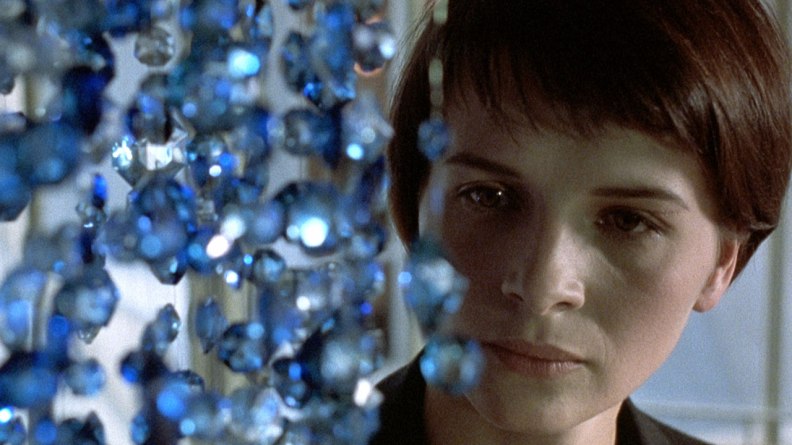 Three Colours: Blue (1993)
Three Colours: Blue (1993)
Krzysztof Kieślowski's film may well be a triumph of cinematography, sound design and art direction over plot: it looks and sounds amazing but arguably not that much happens in it. Music features a lot as there is a composer in it; one striking scene shows the compositional process taking place, the music we are hearing changing as decisions are made on how to arrange the piece.
As you know, the film is in some way meant to draw on the idea of Liberty that underpins the blue in the French flag. What exactly the main character Julie (memorably played by Juliette Binoche) is breaking free from is ambiguous. At the start of the film her husband and daughter die in a car crash (sorry for spoiling a film released thirty years ago) so is she being freed from the constraints of family life? Or is the film about her being freed from the shackles of grief? Either way I found her husband a mysterious offscreen presence whose point in life is hard to determine. He is a famous and highly successful composer but anyone with half a brain twigs almost immediately that it is actually Julie who was writing his music (this is so obvious to anyone with half a brain that it can't be considered a spoiler). Quite why she was letting him take the credit is never addressed. And he also turns out to be getting it on with a lawyer on the side. I really struggled to see why Julie had stuck with this guy (admittedly she only found about the extracurricular shagging after his death). I was also struck by how when Julie asks another guy whether he loves her and/or fancies a shag, she addresses him as "vous".
 Rye Lane (2023)
When I walked into the cinema auditorium for an afternoon screening of Raine Allen-Miller's film there was only one other person there, a woman, which felt like the meet cute opening to a rom com. Then other people came in and ruined everything. Rye Lane meanwhile is that rare thing: a rom com that is both funny and kind of cute, like a Richard Curtis film that isn't shit and doesn't exist in a parallel universe in which non-white people have been purged from London. There is a lot of music, including a great moment that had me thinking about possibly exploring the work of whatever Terence Trent D'Arby is calling himself these days. I also liked the arse-themed art show that brings up the rear of the film.
Rye Lane (2023)
When I walked into the cinema auditorium for an afternoon screening of Raine Allen-Miller's film there was only one other person there, a woman, which felt like the meet cute opening to a rom com. Then other people came in and ruined everything. Rye Lane meanwhile is that rare thing: a rom com that is both funny and kind of cute, like a Richard Curtis film that isn't shit and doesn't exist in a parallel universe in which non-white people have been purged from London. There is a lot of music, including a great moment that had me thinking about possibly exploring the work of whatever Terence Trent D'Arby is calling himself these days. I also liked the arse-themed art show that brings up the rear of the film.
If you are being in any way reflective when making a film in a genre you have to think about how you will engage with the conventions of the genre, particularly ones that people have started to consider problematic. Do you just follow the conventions, in an "I don't make the rules" way? Do you ignore them, albeit running the risk thereby of effectively making a film that falls outside the genre you were aiming for? Or do you attempt to subvert the genre? In Rye Lane this is most noticeable in the way the film engages with the manic pixie dream girl stock character (the free spirited perky woman who for no obvious reason decides to spice up the life of a deadbeat male protagonist). Rye Lane sees Yas (Vivian Oparah) barge into the life of Dom (David Jonsson) after she encounters him crying in a bathroom over a recent bad break-up. The film seems to follow the MPDG line, with Yas bringing Dom out of himself as they race around having a fun and exciting time. But I think there is enough of a switcheroo in the storyline that stops Yas being just a prop to Dom's story. I do wonder though whether we are seeing a new genre convention emerge, the subverted manic pixie dream girl.
images:
Juliette Binoche in Three Colours: Blue (A World of Film: "Trois Couleurs: Bleu (1993) – Krzysztof Kieslowski (Niall McArdle)")
David Jonsson and Vivian Oparah in Rye Lane (Radio Times: "Rye Lane soundtrack: all the songs in the new romcom")
No comments:
Post a Comment